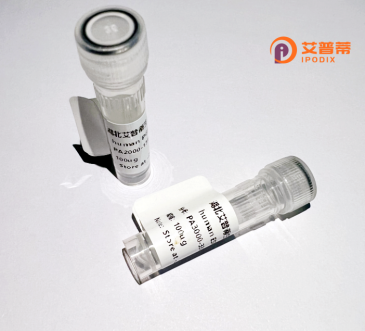
| 纯度 | >90%SDS-PAGE. |
| 种属 | Human |
| 靶点 | HSD3B7 |
| Uniprot No | Q9H2F3 |
| 内毒素 | < 0.01EU/μg |
| 表达宿主 | E.coli |
| 表达区间 | 1-369aa |
| 氨基酸序列 | MADSAQAQKLVYLVTGGCGFLGEHVVRMLLQREPRLGELRVFDQHLGPWLEELKTGPVRVTAIQGDVTQAHEVAAAVAGAHVVIHTAGLVDVFGRASPKTIHEVNVQGTRNVIEACVQTGTRFLVYTSSMEVVGPNTKGHPFYRGNEDTPYEAVHRHPYPCSKALAEWLVLEANGRKVRGGLPLVTCALRPTGIYGEGHQIMRDFYRQGLRLGGWLFRAIPASVEHGRVYVGNVAWMHVLAARELEQRATLMGGQVYFCYDGSPYRSYEDFNMEFLGPCGLRLVGARPLLPYWLLVFLAALNALLQWLLRPLVLYAPLLNPYTLAVANTTFTVSTDKAQRHFGYEPLFSWEDSRTRTILWVQAATGSAQ |
| 分子量 | 67.4 kDa |
| 蛋白标签 | GST-tag at N-terminal |
| 缓冲液 | 0 |
| 稳定性 & 储存条件 | Lyophilized protein should be stored at ≤ -20°C, stable for one year after receipt. Reconstituted protein solution can be stored at 2-8°C for 2-7 days. Aliquots of reconstituted samples are stable at ≤ -20°C for 3 months. |
| 复溶 | Always centrifuge tubes before opening.Do not mix by vortex or pipetting. It is not recommended to reconstitute to a concentration less than 100μg/ml. Dissolve the lyophilized protein in distilled water. Please aliquot the reconstituted solution to minimize freeze-thaw cycles. |
以下是关于重组人HSD3B7蛋白的3篇参考文献概要:
1. **文献名称**:*Cloning and molecular characterization of the human 3β-hydroxy-Δ5-C27-steroid dehydrogenase (HSD3B7)*
**作者**:Setchell, K.D.R. et al. (2003)
**摘要**:该研究首次克隆并鉴定了人HSD3B7的cDNA,证明其编码的蛋白在胆汁酸合成中催化关键步骤,并发现其突变与婴儿进行性家族性肝内胆汁淤积症相关。
2. **文献名称**:*HSD3B7 enzyme structure and mutations causing neonatal cholestasis*
**作者**:Ueki, I. et al. (2008)
**摘要**:通过重组表达HSD3B7蛋白,解析其酶活性和底物特异性,并发现该酶的结构域缺陷会直接导致新生儿胆汁酸合成障碍和肝病。
3. **文献名称**:*Functional analysis of recombinant HSD3B7 in metabolic defects*
**作者**:Heubi, J.E. et al. (2005)
**摘要**:利用重组HSD3B7蛋白体外实验验证其在3β-羟基类固醇氧化/异构反应中的核心作用,揭示了酶活性不足引起的胆汁酸代谢异常机制。
如需扩展,可补充第四篇:
4. **文献名称**:*Gene variants in HSD3B7 and cholesterol metabolism disorders*
**作者**:Pullinger, C.R. et al. (2010)
**摘要**:通过重组蛋白模型结合临床数据,阐明HSD3B7基因多态性对胆固醇代谢和肝胆疾病易感性的影响。
以上研究聚焦重组HSD3B7的功能验证及病理关联,适用于酶学、遗传病或药物开发参考。
Human hydroxysteroid dehydrogenase 3B7 (HSD3B7) is a critical enzyme in the biosynthesis of bile acids, which play essential roles in lipid digestion, cholesterol homeostasis, and metabolic regulation. As a member of the short-chain dehydrogenase/reductase (SDR) family, HSD3B7 catalyzes the oxidation of 7α-hydroxy and 7β-hydroxy groups of sterol intermediates during bile acid synthesis, particularly converting 7α-hydroxy-cholesten-3-one to 7-oxo-cholesten-3-one in the classic pathway. This step is vital for the formation of primary bile acids like cholic acid and chenodeoxycholic acid.
Defects in the HSD3B7 gene are linked to severe inherited disorders, such as congenital bile acid synthesis defect type 1 (CBAS1), characterized by neonatal cholestasis, liver fibrosis, and malabsorption. Recombinant human HSD3B7 protein, produced through heterologous expression systems (e.g., E. coli or mammalian cells), serves as a key tool for studying enzymatic mechanisms, substrate specificity, and disease-related mutations. It is widely used in biochemical assays, drug screening for bile acid-related disorders, and structural studies to identify potential therapeutic targets. The protein typically retains its NAD+-dependent oxidoreductase activity, enabling functional analysis in vitro. Research on recombinant HSD3B7 has advanced understanding of bile acid metabolism and its pathophysiological implications in liver diseases and metabolic syndromes.
×